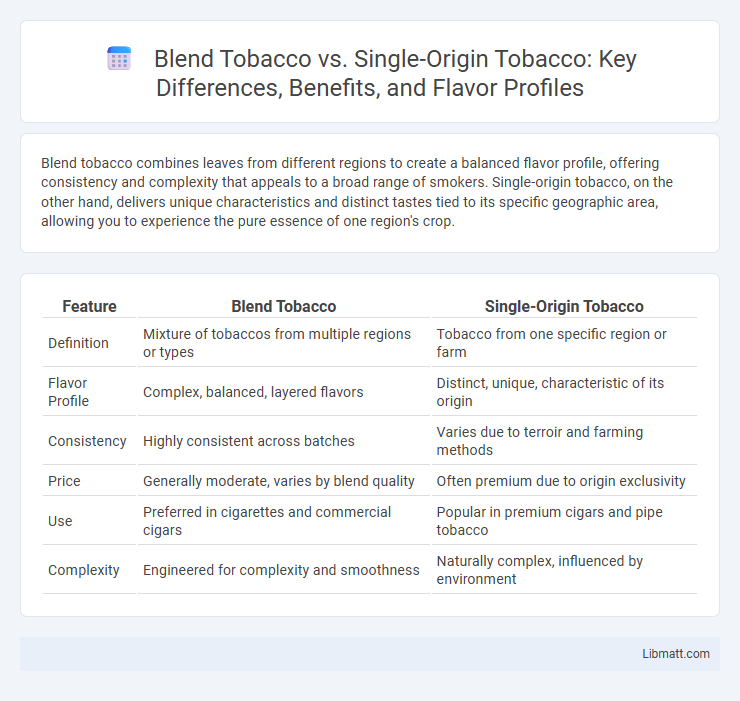Blend tobacco combines leaves from different regions to create a balanced flavor profile, offering consistency and complexity that appeals to a broad range of smokers. Single-origin tobacco, on the other hand, delivers unique characteristics and distinct tastes tied to its specific geographic area, allowing you to experience the pure essence of one region's crop.
Table of Comparison
| Feature | Blend Tobacco | Single-Origin Tobacco |
|---|---|---|
| Definition | Mixture of tobaccos from multiple regions or types | Tobacco from one specific region or farm |
| Flavor Profile | Complex, balanced, layered flavors | Distinct, unique, characteristic of its origin |
| Consistency | Highly consistent across batches | Varies due to terroir and farming methods |
| Price | Generally moderate, varies by blend quality | Often premium due to origin exclusivity |
| Use | Preferred in cigarettes and commercial cigars | Popular in premium cigars and pipe tobacco |
| Complexity | Engineered for complexity and smoothness | Naturally complex, influenced by environment |
Introduction to Blend Tobacco and Single-Origin Tobacco
Blend tobacco combines leaves from multiple regions or varieties to create a consistent flavor profile, offering complexity and balance preferred in many commercial cigarettes and cigars. Single-origin tobacco, sourced exclusively from one specific region or plantation, emphasizes unique terroir flavors and distinctive characteristics inherent to that location. Connoisseurs often select single-origin tobacco to experience pure, unblended taste profiles that highlight regional nuances.
Definitions: What Is Blend Tobacco?
Blend tobacco consists of a combination of different tobacco types, such as Virginia, Burley, and Oriental, mixed to create unique flavors and smoking experiences. Single-origin tobacco refers to tobacco sourced exclusively from one geographic region or specific farm, offering distinct taste profiles characteristic of that area. Blends aim to balance strength, aroma, and flavor complexity, while single-origin tobaccos emphasize purity and regional terroir.
Understanding Single-Origin Tobacco
Single-origin tobacco refers to leaves harvested exclusively from a specific geographic region, offering unique flavor profiles shaped by local soil, climate, and cultivation methods. Unlike blends, which mix tobaccos from multiple origins to achieve a balanced or complex taste, single-origin tobaccos highlight the distinct characteristics of their native terroir. This precise sourcing allows connoisseurs to experience the pure, unaltered essence of tobacco from renowned regions such as Cuba, Virginia, or the Dominican Republic.
Key Differences Between Blend and Single-Origin Tobacco
Blend tobacco combines leaves from multiple regions, offering a balanced flavor profile with consistent taste and aroma. Single-origin tobacco comes from a specific location, highlighting unique characteristics and terroir that give your smoke a distinct and authentic experience. Understanding these key differences helps you choose between complexity in blends or the purity found in single-origin tobaccos.
Flavor Profiles: Complexity vs. Purity
Blend tobacco offers a complex flavor profile by combining various types of tobacco leaves, resulting in richer, layered notes that appeal to those seeking depth and variety. Single-origin tobacco highlights purity, showcasing the distinct characteristics and terroir of a specific region, providing a more consistent and straightforward taste experience. Selecting between blend and single-origin depends on whether one prefers multifaceted complexity or focused, authentic flavor expression.
Production and Sourcing Methods
Blend tobacco combines leaves sourced from multiple regions, leveraging diverse climates and soil types to create a balanced and consistent flavor profile through blending techniques. Single-origin tobacco is cultivated in a specific geographic area, where unique terroir and farming practices impart distinct characteristics, emphasizing traceability and regional authenticity. Production methods for blends involve meticulous selection and mixing of various tobaccos, while single-origin production focuses on preserving the natural qualities of the crop with minimal intervention.
Popular Brands and Notable Examples
Popular blend tobacco brands include American Spirit, known for its smooth taste profile crafted from various leaf origins, and Captain Black, recognized for its rich, aromatic flavor combining multiple tobaccos. Single-origin tobacco highlights brands like Cuba's Cohiba, celebrated for its distinct flavor tied solely to Cuban tobacco, and Dunhill, which offers premium pure-origin blends emphasizing geographic terroir. These brands demonstrate how blend tobacco focuses on flavor complexity, while single-origin emphasizes unique, localized tobacco characteristics.
Smoking Experience and Consumer Preferences
Blend tobacco offers a complex smoking experience by combining various leaf types for balanced flavor and aroma, appealing to smokers who enjoy multidimensional taste profiles. Single-origin tobacco delivers a purer, more distinctive flavor reflecting its specific region, ideal for consumers seeking authenticity and unique terroir characteristics. Your preference depends on whether you value versatility and smoothness or a rich, singular smoking experience.
Pricing and Market Availability
Blend tobacco generally offers more competitive pricing due to the combination of multiple tobacco types, making it widely available across various markets and suitable for consumers seeking affordability. Single-origin tobacco commands higher prices because it highlights unique regional flavors and limited production, appealing to connoisseurs and specialty markets. Your choice depends on whether you prioritize cost-effectiveness or exclusive, terroir-driven tobacco experiences.
Choosing Between Blend and Single-Origin Tobacco
Choosing between blend tobacco and single-origin tobacco depends on your preference for complexity and consistency. Blend tobacco combines leaves from different regions or types, offering a balanced, multi-layered flavor profile tailored to suit varied tastes. Single-origin tobacco provides a distinctive, pure taste reflecting the unique terroir of a specific growing area, ideal for those who want to explore nuanced, authentic tobacco flavors in your smoking experience.
Blend tobacco vs single-origin Infographic

 libmatt.com
libmatt.com